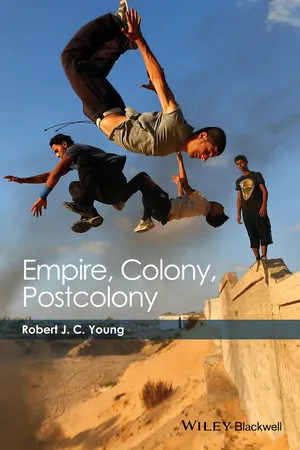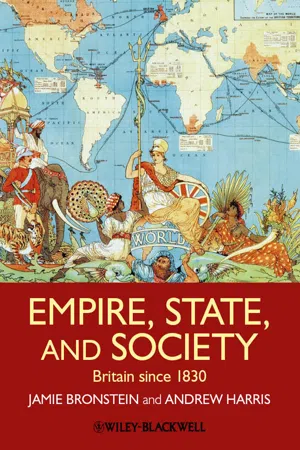History
Royal Colonies
Royal Colonies were colonies in America that were under the direct control of the English monarchy. They were governed by officials appointed by the king, and their laws and regulations were subject to approval by the Crown. Examples of Royal Colonies included Virginia, Massachusetts, and New York.
Written by Perlego with AI-assistance
Related key terms
2 Key excerpts on "Royal Colonies"
- eBook - ePub
- Robert J. C. Young(Author)
- 2015(Publication Date)
- Wiley-Blackwell(Publisher)
The Greek practice of autonomous colonies did not survive the creation of the Roman Empire: colony and empire ever since have retained an unbroken identification of each with the other, even if that relation has often been one of tension and conflict. While colony comprises the individual settlement, empire includes the totality of settlements from the point of view of the metropolis which is the center of imperial administration. The majority of modern European colonies were formed on the Roman political model, involving the founding of a settlement in a separate, usually overseas, locality which sought to expand the territory and reduplicate or renew the culture of the parent country (“New” Amsterdam, England, Spain, York, etc.) while retaining allegiance to it and submitting to its overall political control. This was the basis of the settlers in British North America. The model of sovereignty in this period meant that, in contrast to ancient Greece, individuals remained subjects of the Crown (and therefore of the law of the state) wherever they might happen to be in the world (Benton 2010). The Pilgrim Fathers and their successors still thought of themselves as English, subjects of the Crown, however much they may have emigrated in order to practice freely their fundamentalist version of Protestantism.Such settlement was originally the enterprise of groups of individuals, corporations, joint-stock companies, or other organizations, rather than initiated directly by states. The state was typically more interested in trade, through funding exploration expeditions aimed at locating places suitable for resource extraction or licensing trading companies to trade in luxury commodities. A different kind of colony consequently developed in the form of trading posts (the Greeks had distinguished between the apoikiai and their trading posts for which they used a different word, emporiai), which in many cases then gradually took on territorial scope. A prime example would be that of the East India Company, which expanded from its original trading outpost (which became the city of Calcutta) to control the whole of India. Such colonies, where trade, resource extraction, or port facilities were primary, rather than settlement, were those now referred to as “exploitation” colonies. While many early European colonies were “settler colonies,” these were generally restricted to regions where Europeans could establish themselves more easily. Settlement only took place in colonies with temperate climates where Europeans could survive. It was widely believed that in tropical countries, even if Europeans were able to stay alive, it was impossible for them to procreate through several generations without returning to their homeland, or alternatively by mixing with native “stock.” For this reason, with the exception of the Caribbean and South America, where racial mixing was widespread, Europeans rarely settled in intemperate climes. British people did not go to settle in India – there were always comparatively few of them in the subcontinent, and most returned sooner or later to where they had come from in the British Isles. In the Caribbean, where the primary form of settlement took the form of the creation of plantations, many plantation owners in fact never left Europe at all, or at most came to visit for short periods (for example, the dilettante novelist William Beckford, reputed at one point to be the richest man in England on the proceeds of his slave estates in Jamaica, or Sir Thomas Bertram, in Jane Austen’s Mansfield Park - eBook - ePub
Empire, State, and Society
Britain since 1830
- Jamie L. Bronstein, Andrew T. Harris(Authors)
- 2011(Publication Date)
- Wiley-Blackwell(Publisher)
Colonies had been settled, acquired or won in such various ways and under such different kinds of British government that colonial rule remained haphazard in the early nineteenth century. Many of the Caribbean islands had self-governing assemblies, as had the American colonies before the revolution. Canada had institutions of representative government after 1791, as did Australia, which had been settled as a penal colony in 1788. Colonial governments always had a governor appointed in London, however, and local assemblies’ legislation could always be overturned by the British Parliament. In 1815 this arrangement was formalized with the creation of the “crown colony,” an entity ruled directly by the British state without need of local validation. This distinguished settler colonies from others, such as India, in which local rulers still ruled, and in which there was no need to introduce British styles of representative government as there were few British settlers to represent.The Indian states had begun as purely commercial ventures with no thought of settlement in the seventeenth century. The East India Company, a joint-stock company chartered with monopoly trading privileges, owned its own ships, paid its own employees, and financed its own military protection, and in this peculiar manner carved out significant portions of India as British colonies by the late eighteenth century. The Company engaged in both peaceful and hostile trading actions that looked little different from local wars. Its employees made trading agreements with Indian princes that looked little different from treaties signed between sovereign states.The Company collected taxes on Indian property for local rulers as part of these agreements, and so grew from a commercial operation into a vast administrative structure involved also in tax collection. It imported textiles from India, pepper from Sumatra and china, silk and tea from China. From the 1760s the Company began expanding its territory in India considerably, and its leaders expanded their responsibilities to include courts of law, armed forces, and many of the trappings of a state itself. In Britain, the Company and its leaders, with the great wealth they accrued, were often viewed as corrupt and beyond British control, and in 1773 Britain began to install government oversight on Company activities. Over the following decades, chartered company rule gradually gave way to direct government control, a process not completed until the state took over Company operations in their entirety in 1858.
Learn about this page
Index pages curate the most relevant extracts from our library of academic textbooks. They’ve been created using an in-house natural language model (NLM), each adding context and meaning to key research topics.

